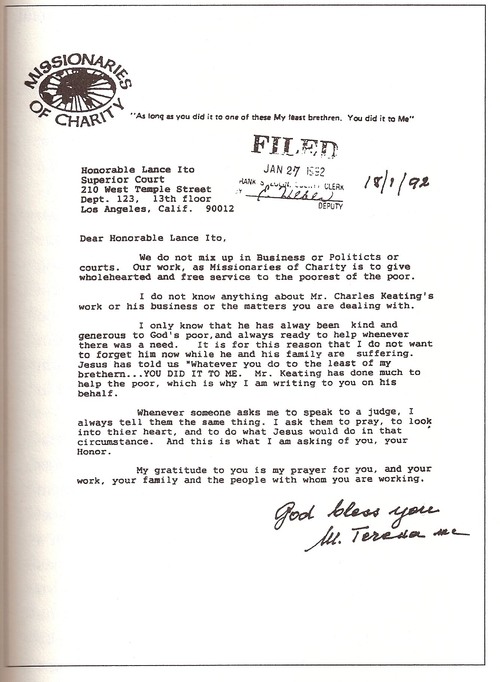On Sunday, September 4, 2016, Pope Francis will oversee a papal mass and canonization service for Mother Teresa. Upon completion, she will be known as Saint Teresa of Calcutta to millions of Roman Catholics and affectionate adorers worldwide. The event falls on the anniversary eve of her death 19 years ago.
There can be little doubt that this woman who was worshipped in life won’t become second only to Mary in idolatrous worship upon the full pronouncement of her sainthood by the throne-sitting apostate vicar of the Tiber.

Many already worship at the relics of Teresa, including a worn pair of her sandals.
While for deceived Roman Catholics Teresa may become a false heavenly intercessor, usurping the role of Christ, for those who know and believe God in His revelation of Scripture, she will be known as the damned follower of an apostate religion that denies the sufficiency of Christ, His Sacred Word, and His sufficient, atoning work. Far from serving as a meritorious icon of faithfulness, she should be seen for what she was during her life, and in her death – an unregenerate soul facing the wrath of God. Apart from solus Christus, good works, like evil ones, are damning.
But when the goodness and loving kindness of God our Savior appeared, he saved us, not because of works done by us in righteousness, but according to his own mercy, by the washing of regeneration and renewal of the Holy Spirit, whom he poured out on us richly through Jesus Christ our Savior, so that being justified by his grace we might become heirs according to the hope of eternal life. Titus 3:4-7
Barring her unlikely deathbed recantation of her idolatrous worship of Mary and the hopeful salvific benefit of her works-righteousness, universalistic theology, to instead embrace salvation by grace alone through faith alone in Christ alone, Teresa is not worthy of emulation, mythification, or sanctification. She is not a saint in death because she was not a saint in life. By the grace of Christ alone, through the gift of faith (Ephesians 2:8) one is made a saint, not through Mary, not the pope, not legions of other such canonized idols of an apostate religion, not through a lifetime of good works.
The popular mythology that has built up around Teresa, who entered into missionary service as a result of hearing, on multiple occasions, the “voice” of Jesus directing her, as well as receiving visions from him, has come under practical scrutiny by numerous detractors. (See HERE, HERE, HERE) Christopher Hitchens, notorious as one of the four horsemen of “new” atheism, produced perhaps (unsurprisingly) the most inflammatory (to Teresa’s advocates) expose on the question-evoking aura surrounding this “saint of the gutters.”
A review of Teresa from 2013 reported that Canadian researchers “trawled through 96 per cent of all originally researched literature on the Catholic icon and concluded that her reputation as one of the holiest women of the twentieth century was the product of hype. Researchers allege missing funds for humanitarian work and homes for the poor that did not offer the medical care they required, leaving many to die.” (Source; Also see Mother Teresa Humanitarian Image ‘A Myth,’ New Study Says from the Huffington Post)
In an article in Slate magazine upon Pope John II’s beatification of Teresa in 2003 – the first step towards official Roman Catholic sainthood – Hitchens commented on Teresa’s well-publicized brushes with ethical responsibility.
MT was not a friend of the poor. She was a friend of poverty. She said that suffering was a gift from God. She spent her life opposing the only known cure for poverty, which is the empowerment of women and the emancipation of them from a livestock version of compulsory reproduction. And she was a friend to the worst of the rich, taking misappropriated money from the atrocious Duvalier family in Haiti (whose rule she praised in return) and from Charles Keating of the Lincoln Savings and Loan. Where did that money, and all the other donations, go? The primitive hospice in Calcutta was as run down when she died as it always had been—she preferred California clinics when she got sick herself—and her order always refused to publish any audit. (Source: Slate)
While Hitchens had the obvious atheist axe to grind, his assessment of Teresa’s failures to actually alleviate suffering and minimize poverty are well noted beyond merely the sphere of disgruntled atheists. (See HERE or HERE or HERE or HERE or HERE or HERE ) It’s telling that a Calcutta newspaper, following Teresa’s death, occurring just a few days after the death of Princess Diana, featured a headline, “Numbed by Diana’s death, Calcutta fails to mourn for Teresa.” (Source)
The obvious concerns relate to the alleged massive amounts of donations her Missionaries of Charity received, receipts the order itself seemed to show absent in its subsequent ministry. Lacking transparency, the order publishes no financial statements, though, as reported by the German magazine Stern, one former sister claims she saw a New York bank account for the order with over $50 million on deposit. Other funds were deposited with the Vatican Bank.
The Keating Savings and Loan scandal from the 1980’s found Teresa rushing to the hopeful aid of Charles Keating, a benefactor to her order to the tune of $1.25 million. She wrote presiding Judge Lance Ito a glowing letter of endorsement on behalf of Keating. When the district attorney responded to advise that the $1.25 million she received was from stolen funds, communication from the “Mother” suddenly ceased. She kept the cash.
(For more on the financial deeds of Teresa’s organization, see this report by Forbes Magazine.)
The charge that Teresa loved poverty, not the poor – which may be substantiated by her failure to use her sizable donations to actually alleviate some of their poverty and provide adequate treatment for their sickness – might be best judged by her own words in response to the criticism elicited by the Hitchens expose:
“There is something beautiful in seeing the poor accept their lot, to suffer it like Christ’s Passion. The world gains much from their suffering.” Mother Teresa
Multiple accounts regarding the wretched condition of her missions of mercy attest to deplorable, unsanitary conditions -accounts widely available upon even a superficial search – seem remarkably ironic and uncharitable given the hundreds of millions of dollars her “charity” was known to rake in.
“At the time of her death, Mother Teresa had opened 517 missions welcoming the poor and sick in more than 100 countries. The missions have been described as “homes for the dying” by doctors visiting several of these establishments in Calcutta. Two-thirds of the people coming to these missions hoped to a find a doctor to treat them, while the other third lay dying without receiving appropriate care. The doctors observed a significant lack of hygiene, even unfit conditions, as well as a shortage of actual care, inadequate food, and no painkillers. The problem is not a lack of money–the Foundation created by Mother Teresa has raised hundreds of millions of dollars.” (Source)
Teresa’s iconic image as a humanitarian was perhaps only second to her consistent pro-life stands. Across numerous, highly public platforms, she placed a priority on speaking against abortion. While the issue was prominently featured in her Nobel Peace Prize acceptance speech in 1979, perhaps her most pithy pro-life moment came during her meeting with then First Lady Hillary Clinton in 1994.
When Clinton inquired of her why she might think America had not yet had a female president, Teresa quipped, “Because she has probably been aborted.” (Source) Teresa’s anti-abortion message at the National Prayer Breakfast event earlier found the Clintons declining to share in the standing ovation she received.
Proclaiming good works and pro-life messages may be noble and sound Christian, but, for Teresa, represented the expression of a false religion based on works. Her proclamations were necessarily void of the Gospel message she herself did not know or profess. Discounting the enemy of our Lord as the “god of this world,” (2 Corinthians 4:4) Teresa placed abortion as the greatest destroyer on earth, rather than the “father of lies.” (John 8:44)
“Any country that accepts abortion is not teaching its people to love, but to use any violence to get what they want. This is why the greatest destroyer of love and peace is abortion.” Mother Teresa
Regardless of the veracity of Teresa’s temporal entanglements and practical disregard for the care of the sick and dying – of which many claims seem to prove out – the fundamental problem with her is not merely the mythic image of a pro-life, social justice, humanitarian that has built up around her. Authentic humanitarian or not, the problem with Teresa is theological.
The problem is her damning, diabolical theology, borne out of the apostasy of the false teachings of Roman Catholicism. Even granting the heaping of good and noble humanitarian works on her diminutive shoulders, disregarding the critics who decry what they see as her callous disregard for charity and practical human aid, and lauding her for an agreeable pro-life agenda – none of which save or take priority over the Gospel -Teresa’s religion was thoroughly man-centered and idolatrous. It exuded paganism, idolatry, and universalism.
Even Catholics ought to find themselves jaw-droppingly indignant at her “we never try to convert to Christianity” words from her book Life In The Spirit: Reflections, Meditations, and Prayers:
“We never try to convert those who receive [aid] to Christianity but in our work we bear witness to the love of God’s presence and if Catholics, Protestants, Buddhists, or agnostics become for this better men — simply better — we will be satisfied. It matters to the individual what church he belongs to. If that individual thinks and believes that this is the only way to God for her or him, this is the way God comes into their life — his life. If he does not know any other way and if he has no doubt so that he does not need to search then this is his way to salvation.” Mother Teresa
Perhaps taking the attributed quote of Saint Francis of Assisi to a hyper, albeit unscriptural, extreme – “Share the gospel … if necessary, use words” – Teresa’s behavior might seem noble for advocates of a pure social justice gospel, but her words indicate a profoundly anti-Christian position. Teresa was a universalist.
Her universalism seems played out within her oft-lauded order of nuns. In his article, The Myth of Mother Teresa, Tim Challies cites the account of a nun of Teresa’s order who responded to a question about what they tell the sick and dying to prepare them for death and eternity. “We tell them to pray to their Bhagwan, to their gods.”
Challies notes three theologically pernicious quotes from Teresa:
“I’ve always said we should help a Hindu become a better Hindu, a Muslim become a better Muslim, a Catholic become a better Catholic.”
“I love all religions. … If people become better Hindus, better Muslims, better Buddhists by our acts of love, then there is something else growing there.”
“All is God — Buddhists, Hindus, Christians, etc., all have access to the same God.”
The discerning believer in the one true God who has revealed Himself in Scripture will recognize the diabolical influence of such quotes. They represent nothing short of the spirit of the age, deceiving the globe with a “many ways to heaven” malodorous theology. But, it’s a theology we’ve been warned against, by our Lord. He called it the “wide path.” (Matthew 7:13). And Teresa, in her own words, lauded that path.
Other words of Teresa reveal her universalistic, social justice, and works righteousness theology, as well. Often infused with mysticism, they reverberate with the false, damning “God loves everyone” theme. Her idolatrous worship of Mary is also evident.
“There are so many religions and each one has its different ways of following God.”
We’d refer, again, to Matthew 7:13-14. Christ makes clear the two paths. His entire incarnate ministry made clear that He, alone, is “the way, the truth, and the life.” (John 14:6) Sorry, Teresa, but there are no “different ways” that will keep you on the narrow path. It’s Christ alone.
“Whether one is Hindu or a Muslim or a Christian, how you live your life is proof that you are or not fully His. We cannot condemn or judge or pass words that will hurt people. We don’t know in what way God is appearing to that soul and what God is drawing that soul to; therefor, who are we to condemn anybody?”
This sounds like the typical post-modern unbeliever today. The strain of mystical, personal relativism is evident. As far as “condemning anybody,” apart from Christ, they are “condemned already.” (John 3:18) Teresa’s failure to know and share His authentic Gospel was complicit in keeping them, and herself, in that state of condemnation.
“When a poor person dies of hunger, it has not happened because God did not take care of him or her. It has happened because neither you nor I wanted to give that person what he or she needed.”
While good works are a result of authentic regeneration, Teresa’s social justice gospel was all social justice and no gospel. To alleviate suffering – to the extent she did that – apart from sharing the truth of Christ’s good news is to merely make the “already condemned” a bit more temporally comfortable while they otherwise are being launched into wrath.
“Before you speak, it is necessary for you to listen, for God speaks in the silence of the heart.”
Mysticism … again. God speaks, to be sure, but He does it in His Word.
“A clean heart is a free heart. A free heart can love Christ with an undivided love in chastity, convinced that nothing and nobody will separate it from his love. Purity, chastity, and virginity created a special beauty in Mary that attracted God’s attention. He showed his great love for the world by giving Jesus to her.”
The proclamation of the unfettered, undistinguishing, justice-free love of God is a common enough mantra of the Scripturally-illiterate, as common as Catholic’s pagan-like idol worship of images and statues of Mary (and other “saints”), accompanied by unbliblical incantations to her for intercession – but whereas the first is a false gospel, the latter is pure idolatry. Of course, Rome changed the Ten Commandments so as to avoid that pesky “thou shalt not” that divinely precludes idol worship (* See below for an explanation)
“Give yourself fully to God. He will use you to accomplish great things on the condition that you believe much more in His love than in your own weakness.”
Smells like a Catholic version of ‘Your Best Life Now.” Achieve great things! God loves you! Work and be blessed! You can do it!
“Each one of them is Jesus in disguise.”
No. While those whom Christ has chosen are united with Him, and His Spirit abides in us, (Galatians 2:20) the unregenerate have a singular relationship with Christ – with Him as sovereign judge. While every knee will bow and tongue confess Him as Lord (Romans 14:11), only His redeemed will enjoy eternal fellowship with Him. If not reminiscent of the prosperity gospel’s “little god” doctrine, this smacks also of the New Age, Eastern “god is in everything” philosophy, which, of course, is wrong, and damning.
“The biggest disease today is not leprosy or tuberculosis, but rather the feeling of being unwanted.”
If you spend a little bit of time consuming Scripture, then pausing to preview the unsaved world, you’ll realize the most glaring, evident need isn’t for someone to provide a salve of friendship and kindness for the lonely; it’s to do the ultimate kindness by sharing the Good News with them, praying that God will work powerfully through it to save them. (Romans 1:16) Sin is the virulent, ubiquitous disease of the world, not loneliness, and the Gospel is the singular solution.
“I am a little pencil in the hand of a writing God who is sending a love letter to the world.”
Umm, no. No, she wasn’t. Teresa’s errant theology nor her works, sans the authentic Gospel, did not represent God’s “love letter to the world.” He’s no longer writing a letter. We have Scripture. Despite Rome’s denial of its authority, the canon of Scripture is closed, His special revelation complete. Our greatest work, one we’re commanded to,(Matthew 28:19) is to share that message in actual words. The Gospel is divine information, not a “hope they see it” charade game we play hoping the unregenerate will recognize it. Good works are a result of our salvation and the ultimate good work is to share the Good News.
“There should be less talk; a preaching point is not a meeting point. What do you do then? Take a broom and clean someone’s house. That says enough.”
Please see the comment above. Oh, and add Romans 10:14 …
How then will they call on him in whom they have not believed? And how are they to believe in him of whom they have never heard? And how are they to hear without someone preaching?
When Francis canonizes Teresa before a crowd estimated to be in the hundreds of thousands in front of St. Peter’s Basilica, with millions more watching live from around the globe, there will, no doubt, be festive anticipation. There will tears of joy, shouts of excitement and glee, and a celebratory atmosphere of awe throughout the crowd at the culmination of this woman’s rise within the Roman church.
But the spectacle to occur at the apostate Roman church on Sunday will pale in comparison to the one which Christ warned about. It comes just a few verses after His admonition, “No, I tell you; but unless you repent, you will all likewise perish.” Luke 13:5
But he will say, ‘I tell you, I do not know where you come from. Depart from me, all you workers of evil!’ In that place there will be weeping and gnashing of teeth. Luke 13:27-28
Don’t be deceived by those proclaiming salvation by anything other than, or in addition to, Christ alone. God has deemed them, and their adherents, cursed. Repent and believe in Christ alone.
But even if we or an angel from heaven should preach to you a gospel contrary to the one we preached to you, let him be accursed. Galatian 1:8
Please also see Why We Can’t Assume Catholics Are Saved.
Be sure to go here and like our Facebook page.
[Contributed by Bud Ahlheim]
* Regarding the alteration of God’s Word to accommodate Catholic idol worship, Mike Gendron, in his book Preparing For Eternity, explains:
“The Roman Catholic Church has removed portions of God’s Word from its Catechisms. In the new Catechism of the Catholic Church, the second commandment of God has been removed. The Vatican also divided the tenth commandment into two to replace the one they removed. What Catholic practice is in violation of the second commandment?
“You shall not make for yourself an idol, or any likeness of what is in heaven above or on the earth beneath or in the waters under the earth. (Exodus 20:4)
By deleting the second commandment from their catechism, what command has the Catholic Church broken?
“Do not add to what I command you and do not subtract from it, but keep the commands of the Lord your God that I give you. (Deuteronomy 4:2)”
(Source: Preparing For Eternity, Mike Gendron, pp 13-14.)
















